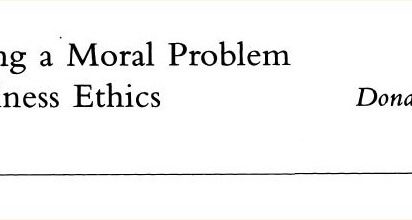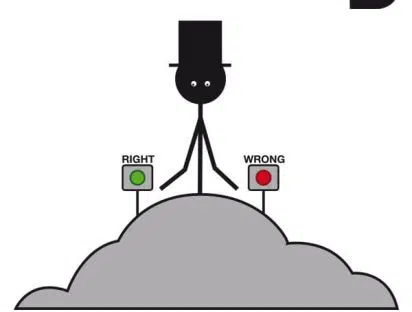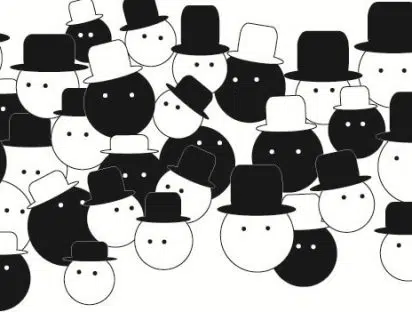The title is an abstract of a sentence from an article in the New York Times published at the end of 2017 (1). The contents of the “uncomfortable roles” described in this article – roles held by Harvey Weinstein’s former “assistants” – tend to evoke spontaneous judgments of moral disapproval (2). They fuel the “global scandal” (3) as well as the revelations arising from the liberation of speech to which it gave rise. It would seem obvious that the way the assistants behave is morally offensive regardless of any reference to the concept of role. Whether or not they were accomplished in the context of a role, their actions would have had the effect of encouraging the criminal and reprehensible actions that the film producer is accused of having committed. In this article, however, I wonder to what extent the judgment of blame on the actions performed when assistants occupied these “uncomfortable roles” depends on the concept of “role” as such. Perhaps this concept does influence, in one way or another, the moral judgment of the observer. After an introductory section (section 1), I discuss two hypotheses relating to two dimensions of the concept of role that could shed light on this question: the rights and obligations attached to a particular role (section 2) and the idea of representation that can be associated with it (section 3).
1.
Extension of the prescribed role
It should be noted that the title sentence seems to defend the idea that, in the present case, the “uncomfortable” role was assigned to employees and not, for example, to relatives or friends. This could suggest that these embarrassing activities, while going beyond the boundaries of the prescribed role – i.e., to sum up, the job description –, were an extension of it and could be linked to it (4). Such an extension is understandable. After all, the tasks of an executive assistant seem transferable to different contexts. Let us consider two examples, one from the business world and the other from the theatre. Here is an example of an executive assistant’s responsibilities taken from a professional website (5):
“Coordinate executive communications, including taking calls, responding to emails and interfacing with clients
Prepare internal and external corporate documents for team members and industry partners
Schedule meetings and appointments and manage travel itineraries
Arrange corporate events to take place outside of the work place, such as golf tournaments, fund-raising events and staff appreciation events
Etc.”
The action verbs mentioned here (coordinate, prepare, prepare, manage, etc.) refer to the professional obligations associated with the role of executive assistant. They apply to different activity contents, i.e., to use some of the words used, to different types of documents, events, meetings or appointments. The example taken from the theatre adds to these formal activities an appropriate state of mind and attitudes, a model of behaviour. In the introduction to one of Ruth Draper’s short monologues, “Three Women and Mr. Clifford,” the private secretary, Miss Nichols, is described as follows:
“She is a young woman of striking capability, charm, energy, efficiency. She speaks in an assure, self-possessed voice, by turns commanding, warmly sympathetic, and sharply perceptive, and is at every moment in complete control of the situation.” (6)
And this is indeed the case. In addition to these qualities, Miss Nichols does not make any professional or moral distinction between her various activities (at least after reading the text and the stage direction). She treats equally the tasks she has to perform. She works with the same diligence, and the same presentation of herself, to settle questions relating to the financial investments of her boss’s aunt, Mr. Clifford, the birthday of his wife (whom he seems to have forgotten) and appointments with the one who appears to be his mistress, Mrs. Mallory. She applies the formal skills of a private secretary to different activity contents. The episode of the flower order is remarkable in this respect. Miss Nichols shows the same professionalism and uses the same words for two different florists – consider for example the “No card – just send the roses… Thank you. Goodbye” at the end of each scene.
2.
First hypothesis: a violation of the rights related to the role
These considerations make it possible to propose an initial hypothesis concerning the sources of the moral judgment of blame relating to “uncomfortable roles.” It should be remembered that we are trying to understand to what extent the concept of role as such can contribute to this judgment, which leads us to leave aside the (fundamental) content of the activities of Harvey Weinstein’s assistants that were reported by the New York Times. The first hypothesis is based on the conception of a role as a set of rights and duties. To be sure, as Anne-Marie Rocheblave-Spenlé noted, “the role […] is not limited to a prescription of rights and duties, but it also includes attitudes and non-formal behaviours” (7). But an observer might consider that these “non-formal behaviours” are nevertheless expected, or even prescribed to the role holder. Miss Nichols’ skills, for example, seem to be in harmony with the rights and duties of a private secretary, even if they are probably not a necessary condition for their actualisation. Suppose that the observers, those who make the moral judgment of blame on the assistants who performed the “uncomfortable roles” described by the New York Times, based partly their judgment on a conception of a role in general as a “prescription of rights and duties.” For argument’s sake, it can be argued that two failures may have increased the strength of their judgment:
a) role holders (“assistants”) lacked discernment about the nature of their duties with respect to their boss;
(b) role holders have, intentionally or unintentionally, ignored their rights, which here led to the possibility of refusing to play the “uncomfortable roles” which were required from them.
The analysis proposed by the New York Times can be interpreted as an illustration of the second breach. This analysis divides a priori the assistants into two categories: careerists and victims (8). The observer making the judgment of blame may have considered that those who belong to the careerist category intentionally waived their right to refuse to obey an illegitimate order, while the victims unintentionally waived their rights to refuse to obey an illegitimate order. The victims, in particular, would have preferred not to renounce their right but would have been forced to do so in one way or another – an assistant whose comments are reported in the New York Times says that “others stayed quiet because they felt like they shared a shameful secret.” In short, the first hypothesis is based on the idea that observers, those who make the moral judgment, considered that the assistants violated the rights attached to their roles.
3.
Second hypothesis: the role as a representation
The sentence just quoted – others stayed quiet because they felt like they shared a shameful secret” – suggests that another dimension of the concept of role may have influenced the moral judgment of disapproval on assistants who fulfilled “uncomfortable roles.” The key word here is “to share.” It leads to viewing the boss as the author of the acts and the employee as an actor acting on his behalf and, as such, representing him (9). In the representation, if the actor does not literally become the author, he can, by personifying him, identify himself with him. In a paper on the duty of a lawyer to represent his client, Charles Wolfram stated that “many lawyers believe that they function best if they are able to share and agree with the values, beliefs, and goals of their clients” (10). While he adds that “this lawyer-client identification is doubtless sometimes feigned,” he concludes by stating that “often it must be real.” There are two additional conceptual reasons for considering that assistants playing “uncomfortable roles” represented their boss. The first one is that the types of roles in question are inherently relational. Just as, to take an example from Michael Banton, the role of a debtor is “invariably associated” with the role of a creditor (11), so it is in relation to the role of his or her boss that the role of the assistant must be understood. Thus, the definition of Miss Nichols’ role depends on the role fulfilled by her boss, Mr. Clifford. The second reason is that the author (Mr. Clifford, Mr. Weinstein, or anyone exerting a managerial power) could have carried out the actions that the actor, who represents him, accomplishes on his behalf. The assistants described by the New York Times substituted for their boss, this substitution implying representation. It is certainly in this respect that their role could be described as “uncomfortable” or “shameful,” and that the assistants could represent their role in this way. A second hypothesis is thus emerging as to the contribution of the concept of “role” to the moral judgment of blame on these assistants. It stems from the process of identifying with the alleged perpetrator of legal and moral wrongdoing, the identification coming from the representation related to their role.
4.
Conclusion
Let’s summarise our assumptions. Faced with the embarrassing roles assumed by assistants, the observer makes a moral judgment of disapproval. It is mainly based on the content of the acts in question. But the concept of role could have contributed in at least two ways to this judgment: – on the one hand, because the assistants allegedly violated some of the rights related to their role, this violation being either intentional or due to a form of coercion (hypothesis 1); – on the other hand, because these assistants, who represented their boss, identified themselves with him to a certain degree (hypothesis 2). We will not go any further, due to lack of space, in the analysis and criticism of these hypotheses. Let us simply conclude by noting that they refer to contemporary research in moral psychology that focus either on justice and rights or on the distinction between the personal or impersonal dimensions of human relationships. We will certainly have the opportunity to come back to these notions in a future article. Alain Anquetil (1) “Weinstein’s Complicity Machine,” New York Times, 5 December 2017. The complete sentence is as follows: “Mr. Weinstein cast some of his youngest and least powerful employees in the most uncomfortable roles.” (2) The New York Times article provides a brief description of the activities of Harvey Weinstein’s assistants. They facilitated her private relationships with women, with the alleged consequences that have been widely reported in the media. (3) The phrase “global scandal” has been used several times to highlight the unusual importance of the case. See for example “How the Harvey Weinstein scandal led to thousands of other women speaking out against sexual harassment in 2017”, HeraldScotland, 29 december 2017, and the French magazine Le Point, “Harvey Weinstein : une si longue impunité” (Harvey Weinstein: Such a long period of impunity). (4) A behaviour which goes beyond the boundaries of the corresponding role is often referred to as “extra-role behavior.” (5) See “Executive Assistant Job Description,” Indeed.com. (6) R. Draper, The art of Ruth Draper. Her dramas and characters, Oxford University Press, 1960. (7) A.-M. Rocheblave-Spenlé, La notion de rôle en psychologie sociale : étude historico-critique, Paris, Presses Universitaires de France, 1962. (8) “Were they careerists doing whatever it took to advance, or victims themselves?” (9) I refer here to Chapter 16 of Thomas Hobbes’ Leviathan. Hobbes argues that “a person is the same that an actor is, both on the stage and in common conversation; and to personate is to act or represent himself or another; and he that acteth another is said to bear his person, or act in his name […]” . It should be noted that the idea of “representation” is not often considered as an attribute of a role. It is only relevant for qualifying certain types of roles, for example that of the lawyer. I consider it to be relevant also in the case at issue, but this would require a particular justification. (10) C. W. Wolfram, “A lawyer’s duty to represent clients,” in D. Luban (Ed.), The good lawyer. Lawyers’ roles and lawyers’ ethics (pp. 214-235), Rowman & Allanheld, 1984. (11) M. Banton, Roles: An introduction to the study of social relations, Tavistock Publications, 1965.




